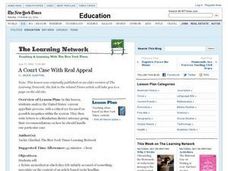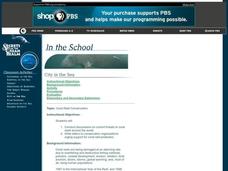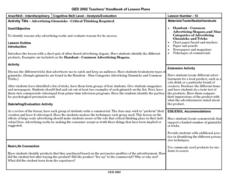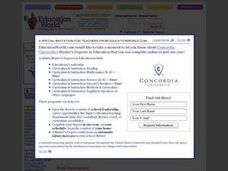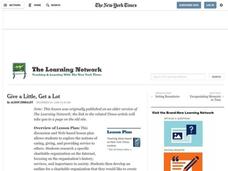Curated OER
By Any Other Name
Young scholars examine the differences between the definitions of race and ethnicity defined by the United States government. After reading an article, they discuss the possiblity of the elimination of some races from the 2010 census....
Curated OER
A Court Case with Real Appeal
Students analyze the United States' current appellate process, with a critical eye focused on possible inequities within the system. They then write letters to a Manhattan district attorney giving their recommendations on how he should...
Curated OER
Louisiana's Legendary Musicians
Students identify and interpret what legendary traditional musicians of Louisiana that allows them to hear new genres of traditional music. They also identify what it means to be a legendary artist and read, write, and create a project...
Curated OER
6 Word Digital Memoirs
Students discuss the idea of 6 word memoirs. In this technology lesson, students explore how using a small number of words sometimes is the best. Students practice using 6 word memoirs writing six words for various nursery rhymes and...
Curated OER
Tall Tales Today
Students explore the attributes of American tall tales. In this folklore lesson, students read several tall tales, describe the elements of tall tales, and then use hyperbole to write their own tall tales.
Curated OER
Teens on Trial
Students read about the public reaction to the conviction of Alex and Derek King, and explore the issue of child offenders being tried and sentenced as adults. They compose letters to Florida Governor Jeb Bush, outlining their opinion on...
Curated OER
Coral Reef Conservation
High schoolers conduct discussions on current threats to coral reefs around the world and write letters to conservation organizations urging support for coral reef protection.
Curated OER
Advertising Gimmicks - Critical Thinking Required
Learners identify reasons why advertising works, evaluate reasons for its success, and write commercials.
Curated OER
Oral Arguments Online
Middle schoolers participate in their own mock oral arguments. They create their own opinions and discuss any opposing opinions. They write their own opinion for a case to end the lesson.
Curated OER
Tectonic Plates, Earthquakes, and Volcanoes
Challenge geography classes to locate the major volcanoes and earthquake faults on a world map. In groups, they identify the pattern made and examine the relationship between the locations of the faults and volcanoes and tectonic...
Curated OER
Picture Dictionary
Students write and contribute one page for a class picture dictionary. They discuss how to alphabetize words, and examine both regular and picture dictionaries and how they are organized. Next they create a page for the class dictionary...
Curated OER
Those Tear-Me-Apart, Put-Me-Back-Together, Never-Be-the-Same-Again Blues
Students discuss what it might be like to be the new person in a group, choose the correct words for an apology, learn a vivid instructional activity about how unking words can hurt others, and write a paragraph to explain what they...
Curated OER
Current Contexts
Young scholars examine how they are affected by world affairs. After reading an article, they examine Otto Frank's attempts to immigrate to America. Using the New York Times, they identify examples of news, advertisements and...
Curated OER
History According to Shakespeare
Learners read Shakespeare's, Julius Caesar while identifying a number of literary elements including simile, metaphor, personification, and hyperbole. As a response activity, they simulate a mock trial, and finally, compare and contrast...
Curated OER
Log Book Guidelines
Students are given the guidelines for their log books. The log book first starts with what is the purpose of a log book. Then students have the instructions on how to organize a log book. From there student are given step by step...
Curated OER
An Aging Population - Economic Problem or Opportunity
Students explore if the aging population has any effect on the economy and overall well-being of society. In this economic lesson, students research the economic impact of the older citizens. They develop their own ideas and...
Curated OER
The Great Cookie Company
Fourth graders implement real life application of money, problem solving, economics, and consumer awareness. In this three week economics unit, 4th graders operate a business, write checks, balance accounts, and market their...
Curated OER
Comparing Covenants
Fifth graders investigate what a covenant was and how they relate to contemporary government ideals. In this comparing covenant lesson, 5th graders examine primary source documents that are examples of covenants from 18th century New...
Curated OER
Middle East Related
Eighth graders find a current event related to the Middle East. In this current event lesson students write a brief summary of a new story related to the Middle East. They give their opinion and tell how it affects their life or who it...
Curated OER
My Symbol
Students paint a symbol representing themselves. In this painting lesson students discuss symbols and view the Interpretive Wall. Students write a poem to generate their personal symbol.
Curated OER
I am a Hero for Animals!
Students explore the humane treatment of animals. In this character development and civic responsibility lesson, students define "hero" and brainstorm related attributes. Students complete an action plan using the "rational approach"...
Curated OER
Give a Little, Get a Lot
Students research a specific charitable organization on the Internet, focusing on the organization's history, services, and importance in society. They develop an outline for a charitable organization with a mission statement.
Curated OER
American Music Styles: European Roots and African Influences - Lesson 3
Students describe some of the characteristics of country and blues music. They see how country music rose to a nationally known music style. They write a two-paragraph essay on what they think country music be like in the next 100 years.
Curated OER
Case Study: Hutu and Tutsi
Students analyze the ethnic conflict between the Hutu and Tutsi in Rwanda and Burundi. They identify the three elements of ethnic conflict, read a handout and answer questions, examine a timeline, conduct research, and write an essay.
Other popular searches
- Outlines for Research Papers
- Expository Writing Outlines
- Persuasive Essay Outlines
- Descriptive Writing Outlines
- "Expository Writing Outlines

